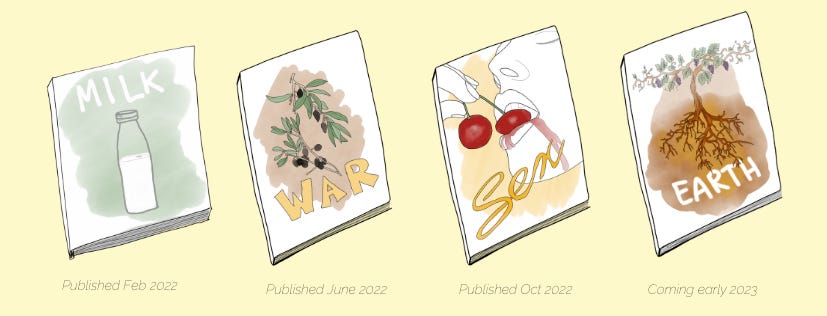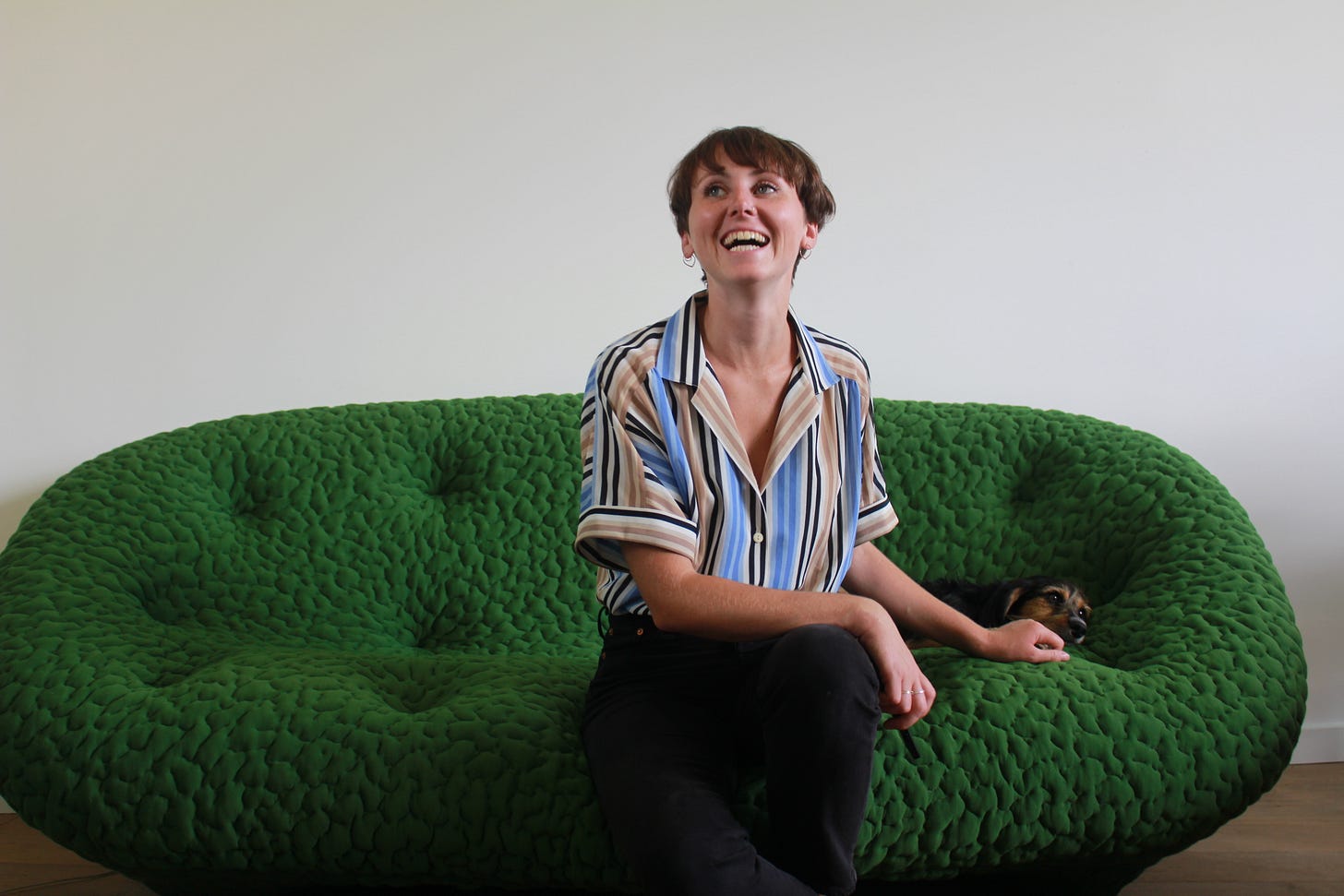The short version: We loved publishing FFJ this year. It has been fun, rewarding, and a great learning experience. As we move into 2023, we want to keep things dynamic — and this means trying new things! We are planning to shift to a staggered publishing model next year, which we hope will better suit the rhythms and reading patterns of our followers. Starting with EARTH, FFJ essays will be coming to your inbox one at a time. Each piece will still be part of a thematic issue, but rather than dropping quarterly, these issues will be released slowly over the span of three months (or so). Expect our first EARTH piece to land in your inbox in January.
Looking forward
We can hardly believe 2022 is already coming to an end. It’s been an exciting and busy 12 months for FFJ. Over the last year, we’ve had the pleasure of working with authors from around the world to bring you three issues — MILK, WAR, and SEX — as well as many newsletters offering feminist perspectives on topics as varied as animal liberation, post-WWII food icons, the dubious promise of alternative proteins, and feminists using food to bring people together in resistance against imperialist aggression in Ukraine. Thank you to everyone who pitched, wrote, read, or otherwise supported us as we got off the ground. We’ve connected with so many brilliant minds and couldn’t be more grateful.
Across all of our work this year, we have learned about the ways that food is both a tool of oppression and a means of resistance. Perhaps it is food’s ubiquity in our everyday lives which makes it such a powerful lens through which our authors have gently uncovered the everyday ways that people around the world resist the “white supremacist capitalist patriarchy” (thank you, bell) — ways that are so often otherwise overlooked. But we end the year equally awestruck by the big, unmissable ways people stand up to these forces. Woman, Life, Freedom: it’s what we all need to keep working towards in 2023.
We’ve been thinking a lot about how our work can be most impactful. In tinkering with our analytics, we’ve realized that FFJ will likely be stronger if delivered in a true newsletter form. This means that in the new year, starting with EARTH, we’ll be publishing our issues in a staggered way, so they will come to your inbox one at a time. Each piece will still be part of a thematic issue, but rather than dropping quarterly, issues will be released slowly over the span of three months (or so). They will still be capped off by our usual Letter from the Editors, aimed at drawing together some of the ideas we’ve tackled and reflecting on what we’ve learned. Each issue will be archived in one place on our Substack, the same way you can see them organized on our homepage now. This staggered model is more faithful to how people actually access our content and will allow us to focus more deeply on each piece rather than trying to spread our attention across a huge batch all at once.
After EARTH, you can look forward to issues on CITY, SEA, and (most likely) SWEET and MEAT (but we also like the idea of HOME!). We’re still aiming to make as much of our work publicly available as possible. Paid subscribers will have access to extra perks like audio versions of our stories, invitations to community events, and our behind-the-scenes newsletters (which are fun if we do say so ourselves).
What do you think? Our inboxes are always open for questions (or suggestions): hello@feministfoodjournal.com.
Looking back
We had a busy year and would love to share our highs and lows. Read on for a brief Q&A with our editors, and leave us a comment to let us know what your own favourite pieces were this year, and what you’d like to see more (or less) of in the next!
Isabela
Favourite piece of your own work?
A Treasure for My Daughter, for sure. It’s a miracle that I ever got through a take of the last section without crying.
Favourite piece of another FFJ writer’s work?
Milking Bodies to Make a Nation by Apoorva Sripathi.
FFJ-related resources that changed the way you think this year?
Books — Small Fires: An Epic in the Kitchen by Rebecca May Johnson, which left me astonished after I finished it earlier this week. Black Food Matters: Racial Justice in the Wake of Food Justice, edited by Hanna Garth and Ashanté M. Reese. A Drum in One Hand, A Sockeye in the Other: Stories of Indigenous Food Sovereignty from the Northwest Coast by Charlotte Coté. The Feminist City: Claiming Space in a Man-Made World by Leslie Kern.
Essays and newsletters — Our Animals, Ourselves by Astra & Sunaura Taylor. Meat House by Roisin Dunnett and Lamb Dressed as Mutton by Jess Fagin1, both for Vittles . On Books by Alicia Kennedy.
Stand-out FFJ moment(s) of the year?
So many! Our online launch party last February — meeting all the MILK writers and readers who supported us — and of course, the after-party with friends in Berlin. Working with writers from all over the world. Getting to write about sex on LinkedIn for our SEX issue (even if I was too chicken to specify “bottoming”). And this tweet from Erin Eberle, who we really hope to meet in person one day.
Biggest challenge?
Trying to balance editing (and our own writing and podcasting) with business development/growth planning.
Biggest learning?
It’s OK to figure things out as you go. Also, the importance of seeking out community. Participating in the Substack Grow program over the summer allowed us to connect and learn from independent writers all over the world. It was amazing to realize how many people share the same challenges we do, and to hear what they’re doing about it!
Most looking forward to in the new year?
Attending the Oxford Real Farming Conference in early January. It’s our first time participating in a conference on behalf of FFJ. The online exhibit hall is already live, and you can check our stall out here.
Zoë
Favourite piece of your own work?
I really loved my conversation with Jennifer Brady and Alanna Higgins about the “war on fatness”.
Favourite piece of another FFJ writer’s work?
The Childless Mothers by Lauren Gitlin.
FFJ-related resources that changed the way you think this year?
Books — The Right to Sex by Amia Srinivasan. Audre Lorde’s Sister Outsider. Black Power Kitchen from Ghetto Gastro by Jon Gray, Pierre Serrao, Lester Walker with Osayi Endolyn.
Essays and Articles — Our Animals, Ourselves by Astra & Sunaura Taylor. Can't Stomach It: How Michael Pollan et al. Made Me Want to Eat Cheetos by Julie Guthman. The Great Canadian Baking Show Is a Pile of Wet Dough by Alex Tesar.
Podcasts — Indigenous Cuisinology (NATIVE COOKING) with Mariah Gladstone of Indigikitchen on the Ologies podcast with Alie Ward. SPAM: How the American Dream Got Canned from The Experiment. BANNOCK on Telling our Twisted Histories.
Stand-out FFJ moment(s) of the year?
I have loved learning about podcasting and audio editing this year. We did a great course with Jill at Bear Radio, which was a highlight for me. It was also very exciting to be mentioned in the “Design Work We Loved This Year” category of Anti-Heroine Media’s 2022 Zelda Awards. It is amazing to feel supported by — and part of a community of — feminist organizations and organizers doing incredible work.
Biggest challenge?
Definitely, time. The most challenging thing about running FFJ this year has been finding time not only to do the day-to-day work of writing and editing but also the important bigger thinking and visioning that is needed to keep FFJ growing and evolving. This takes more than just an hour carved out here or there. It requires headspace and creative juices, which are sometimes hard to cultivate in between all the other demands of our busy lives!
Biggest learning?
I’ve learned too many things to list, but one thing that I have really loved is how working on FFJ (and with Isabela) has helped me to grow as an editor.
Most looking forward to in the new year?
Having more time to work on FFJ and to build on what we’ve learned so far. With some life changes afoot for me in 2023, I’m excited to give FFJ more of the time and mental energy it deserves.
Here’s to 2023! Thanks so much for your support.
Our first version of this newsletter accidentally listed Heedayah Lockman as the author of this piece. It was written by Jess Fagin, with an incredible illustration by Heedayah Lockman.







